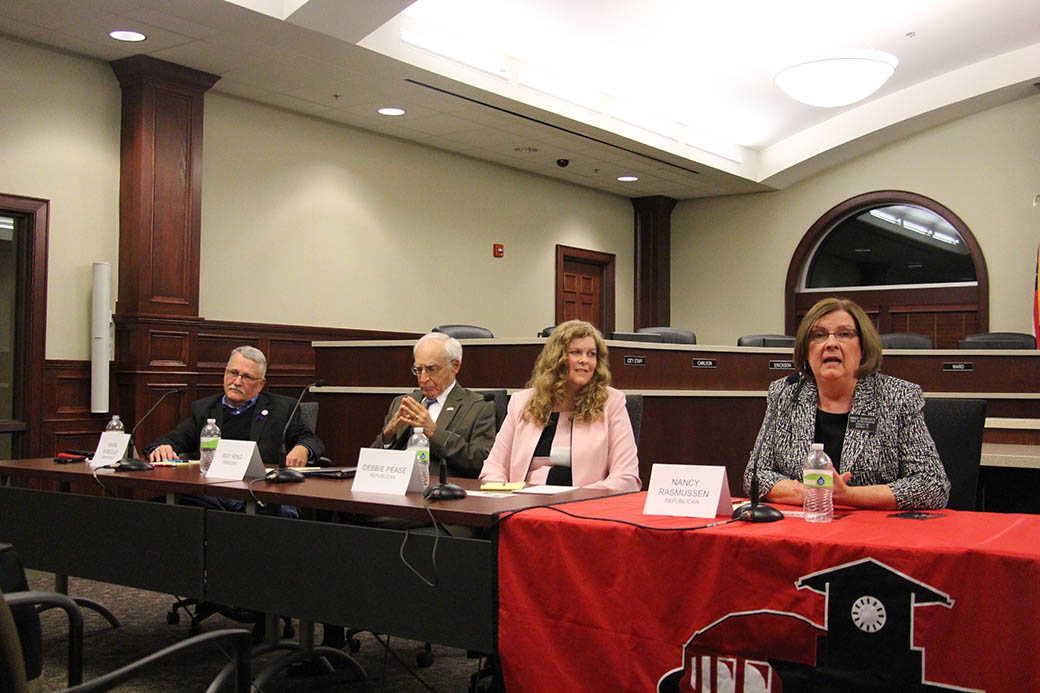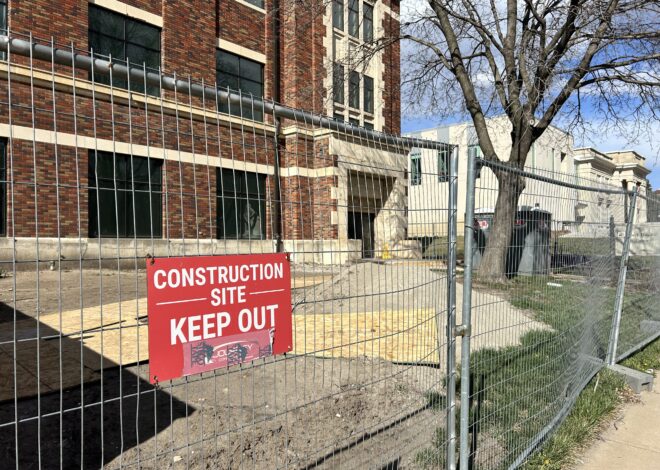
Local state candidates talk policy issues at town hall debate
Candidates running for the Clay County House and Senate seats were involved in a townhall-style debate on Tuesday.
The candidates running for the Democratic House are Mike Winegar and Ray Ring. For the Republican House, Nancy Rasmussen and Debbie Pease. Lastly, for the Senate, Democrat Shane Merill and Republican Arthur Rusch
are running.
All of the candidates gave opening statements as the debate
was beginning.
“This election as far as I’m concerned is not about me, it’s about you,” Winegar said. “It’s about the state that you want to have for your children and your grandchildren.”
After the opening statements, questions on a sheet of paper were given to the moderator, Julia Hellwege, a political science professor at USD, from audience members. Those various questions brought the issues of Medicaid, the death penalty and legislative issues that the candidates got a chance to respond to.
The candidates were asked what they would do to make sure Medicaid expansion in 2017 to make it possible for all citizens to
be ensured.
“I have told everyone that questioned me last year and this year that if the issue of Medicaid expansion comes up that I would vote in favor of that. It’s a no brainer,” Rusch said. “If the federal government will undertake the responsibility of medical care for the Native American tribes which they contacted to by treaty (and) we would probably even have some extra money left over.”
Merill also agreed that expanding Medicaid is the best option for the state.
“I support (expanding it) 100 percent,” Merill said. “We’re going to expand health coverage to 55,000 South Dakotans, 800 right here in this district.”
Rasmussen gave insight to why she is against expanding Medicaid:
“We are being asked to take on something that the federal government has not honored for a very long time and the health services are in a very bad state, they are closing their hospitals,” Rasmussen said. “They haven’t taken care of the people that they should have been taking care of in the first place — this is a third way agreement and I think that is always tricky.”
According to Pease, she knows what it is like to live without insurance. Her husband, a teacher, lost his job three years ago and started his own business. Pease worked part time jobs and in-between Pease and her husband didn’t have health coverage for three years.
“I know what it is like to go to the free clinic [and] I know that this is a serious issue,” Pease said. “But, I have concerns when we take money from the federal government, there are strings attached. Not to mention that our federal government is $20 trillion in debt and we keep growing it.”
After talk about Medicaid, the question about the death penalty was asked and if any of the candidates would support it or not.
Rusch explained that he rejects the death penalty.
“I was the leading sponsor of the bill to repeal the death penalty last session. I was the first legislature in the history of the state of South Dakota who has personally tried a death penalty case and sentenced a man to death,” Rusch said. “When you try that kind of a case you see the cost, you see the effect on the jurors and the people that are executed are the ones that consent to
be executed.”
Rasmussen would vote to keep the law as it is.
“Someone from Turner County shot a father and a son over water, he was given life imprisonment and (after) 35 years they were going to let him out,” Rasmussen said. “When we are told that someone will spend the rest of their life in jail, it just doesn’t happen and none of us like the death penalty but there are some cases that are so horrific.”
Lastly, earlier in the year, the legislature passed a bill known as the “Transgender Bathroom Bill,” which would require public school students to use facilities based on their chromosomes and anatomy at birth. Governor Dennis Daugaard vetoed the bill and the legislature failed to override the veto. The question that was asked was, “would the candidates expect the bill to come back?”
Ray Ring gave some insight on his thoughts on the bill at the time.
“What I really focused on with the bill when I really considered it was the alternative bathroom. That there would be another place for transgender students to go to the bathroom,” Ring said. “That seemed like a reasonable compromise.”
Ring then mentioned the circumstance that occurred with the bill.
“The prime sponsor asked us to sustain the governor’s veto,” Ring said. “By that time, it seemed clear to me that there were many more issues involved than I originally realized.”
Lastly, Rusch gave his insight on the bill.
“I don’t see where it’s a problem and I’m not sure that we need the bill,” Rusch said. “I don’t think it’s a problem if the school (is) spending the money to provide these
alternative bathrooms.”
After the many issues that were discussed, it then came time for the closing statements. Once the forum was over, some candidates stayed as others left.
First-year USD student Briggs Warren explained which issues are important to him as he talked
to Rasmussen.
“We look at the legislature now and it’s skewed kind of older and so those kind of issues tend to get focused on more,” Warren said. “So having the focus shift at what will help everybody and not only those older people.”
Lastly, Winegar explained why voting is important for students, especially for this election.
“I advise for students to if they can find the time, (to go) down to the courthouse and vote early,” Winegar said. “If you’re (also not) in Clay County, get (your) absentee ballots filled in, get them back, and let’s get this election behind us.”
The election takes place Nov. 8.



